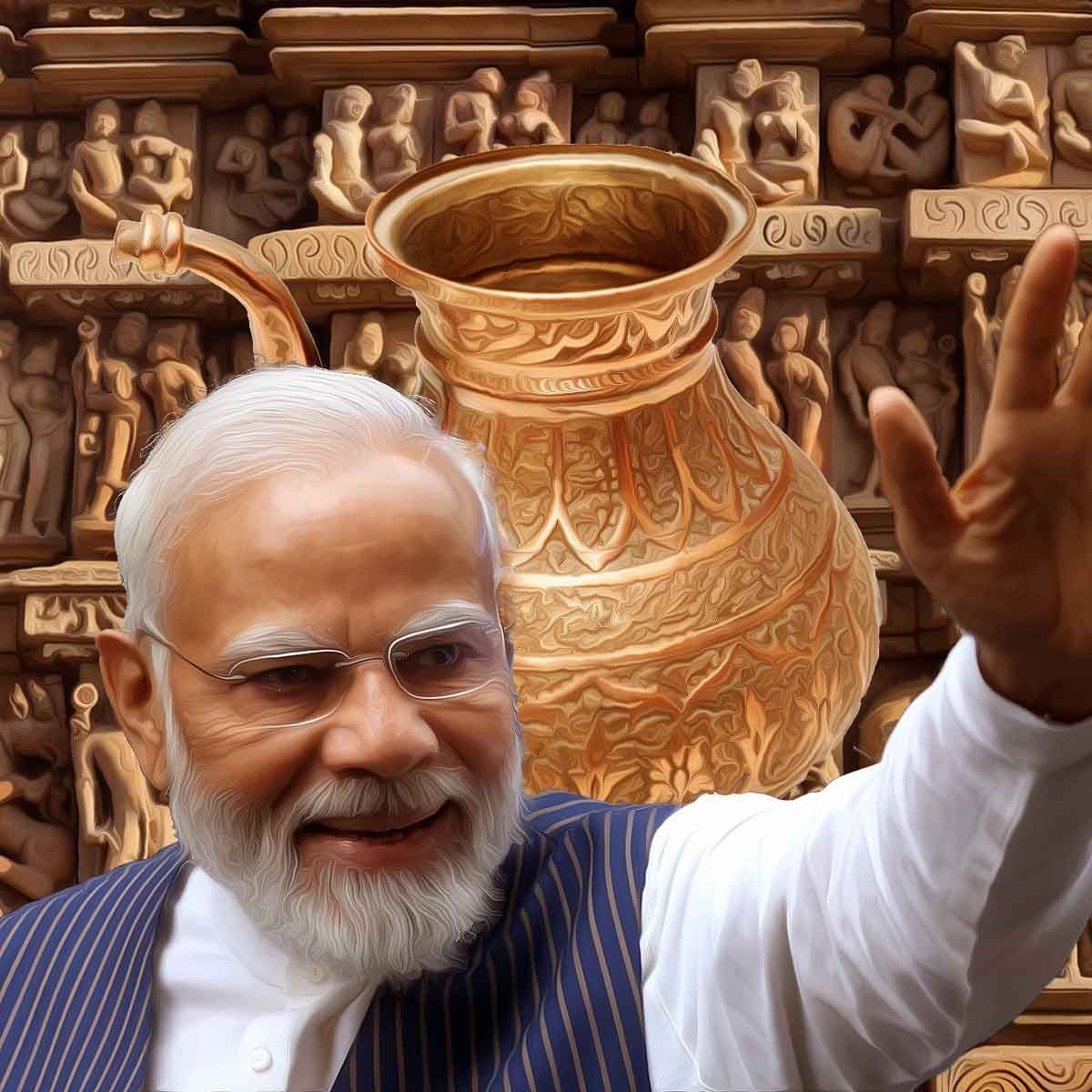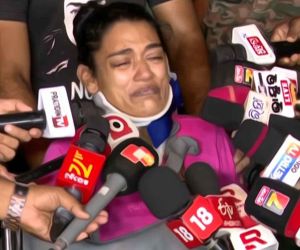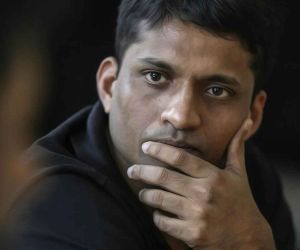MORE COVERAGE
Twitter Coverage
Satyaagrah
Written on
Satyaagrah
Written on
Satyaagrah
Written on
Satyaagrah
Written on
Satyaagrah
Written on
JOIN SATYAAGRAH SOCIAL MEDIA
"एक एक को चुन चुन के मारूंगा": Lashkar-e-Taiba terrorist Habibullah, alias Bhola Khan, shot dead in Pakistan, igniting fear among militants, internet blackout grips the nation, Dawar Khan Kundi reels from the shock of losing his cousin to unknown gunmen

In a significant development reported by ANN News, Habibullah, a top militant and recruiter linked to the Lashkar-e-Taiba (LeT), was killed in Pakistan's Khyber Pakhtunkhwa province. The incident occurred on Sunday evening in the Khyber district when Habibullah was fatally shot by unidentified gunmen. This event is part of a recent pattern of targeted killings in the region, as evidenced by over 19 high-profile terrorists suffering similar fates in Pakistan in the recent months.
|
Habibullah's death in this manner raises questions about the security dynamics within Pakistan, especially concerning militants and terrorist groups. The killing of such a prominent figure in the LeT, an organization known for its militant activities, suggests a heightened level of internal conflict or a targeted operation by unknown entities. The impact of his demise on the LeT's operations and recruitment could be significant, given his reported role within the organization.
The timing of this incident coincided with another major report that surfaced the same day regarding Dawood Ibrahim, one of India's most-wanted fugitives. Ibrahim, known for his alleged criminal activities and connections, was reportedly hospitalized due to poisoning by unknown assailants. This parallel development adds to the intrigue surrounding the security and intelligence operations in the region, hinting at a larger backdrop of covert actions and counter-terrorism efforts.
These events, unfolding in close temporal proximity, indicate an ongoing and possibly escalating covert struggle within and possibly between nations in the region. The targeted killing of a figure like Habibullah, alongside the reported poisoning of Dawood Ibrahim, suggests a complex and volatile security environment in South Asia. Such incidents often have far-reaching implications, affecting not only the immediate stakeholders but also the broader regional dynamics and counter-terrorism strategies.
In a recent development that could be seen as a positive turn for India's ongoing battle against terrorism, there have been reports of another significant blow to anti-India elements operating from Pakistan. Habibullah alias Bhola Khan alias Khan Baba, the cousin of Dawar Khan Kundi, known for his involvement in activities against India, was reportedly shot dead in Pakistan. The incident, which left Dawar Khan Kundi in shock, occurred in Runwal where Bhola Khan was attacked and killed instantly by unknown assailants. The local police promptly responded to the scene, transferring Bhola Khan's body to a hospital.
|
This incident adds to a series of targeted attacks on individuals associated with militant activities and groups known for their hostility towards India. The killing of Bhola Khan, closely related to a figure actively involved in anti-India operations, could be indicative of internal rifts or targeted efforts to dismantle networks hostile to India.
Further intensifying the situation, sources report that Habibullah, a notorious terrorist and recruiter for Lashkar-e-Taiba (LeT), was also killed in an ambush by unidentified gunmen. This attack took place in the Tank district of Khyber Pakhtunkhwa on Sunday evening. Habibullah's death follows the pattern of targeted killings of high-profile militants in Pakistan, including the recent assassination of Adnan Ahmed, a close associate of LeT founder and mastermind of the 26/11 Mumbai terrorist attacks, Hafiz Saeed. Ahmed met a similar fate in Karachi a few weeks prior.
The demise of these key figures, who have been linked to anti-India activities and organizations like LeT, marks a significant setback for militant groups operating in the region. These incidents may be perceived as advantageous for India, potentially weakening the operational capabilities of groups that have historically posed threats to its security. The sequence of these killings suggests a possible escalation in targeted efforts against individuals linked to organizations known for their militant stance against India. This could signal a shift in the dynamics of regional terrorism and counter-terrorism strategies, potentially leading to a more secure environment for India.
|
The district of Tank in Pakistan's Khyber Pakhtunkhwa province has been under the spotlight for security incidents, marking the second time in a week it has made headlines due to violent attacks. On December 15th, an alarming incident unfolded when terrorists launched an attack targeting a police headquarters and post in Tank district. This assault on the police line resulted in the tragic loss of three policemen's lives and left three others injured. The event also saw a significant retaliation from the police forces, leading to the death of four terrorists.
The details of the attack are both distressing and revealing. One terrorist reportedly detonated explosives at the main entrance of the police complex, while others infiltrated the premises. Such tactics indicate a high level of planning and determination on the part of the attackers, underscoring the ongoing challenges faced by law enforcement agencies in the region.
Responsibility for this brazen attack was claimed by a relatively new terrorist group known as Ansarul Jihad. The emergence of such groups and their ability to carry out coordinated attacks pose a significant threat not only to the immediate region but also to neighboring countries, including India.
|
From India's perspective, these incidents in Pakistan's Tank district could be seen in a dual light. On one hand, they reflect the ongoing instability and security challenges within Pakistan, which might indirectly impact India, considering the historical and geopolitical context. On the other hand, the weakening of terrorist outfits and the targeting of their operatives, as evidenced by the death of four terrorists in the retaliation, could be viewed as a positive development in terms of regional security.
India's stance on the recent spate of targeted killings in Pakistan has been one of deliberate non-engagement. The Ministry of External Affairs (MEA), representing India's diplomatic position, has chosen not to comment on these incidents. External Affairs Ministry spokesperson Arindam Bagchi, addressing inquiries about the situation, stated, "Those who want to face justice for criminal and terrorist activities in India, we would like them to come to India and face our legal system, but I would like to look at the developments in Pakistan. Can't comment." This statement reflects a focused approach by India, prioritizing its own legal and security concerns over commenting on internal matters of Pakistan.
Bagchi's emphasis on wanting individuals involved in criminal and terrorist activities against India to be subject to Indian law highlights a clear and consistent stance by India on cross-border terrorism and justice. By refraining from commenting on Pakistan's internal affairs, the MEA is maintaining a diplomatic boundary, focusing on India's interests and legal processes.
|
In another development within Pakistan, there were reports of a sudden blackout at airports and an internet outage on Sunday (17th December). This incident gained attention, especially as it coincided with a scheduled virtual meeting of the Pakistan Tehreek-e-Insaf (PTI) party. PTI leaders have claimed that this was a deliberate act to disrupt their meeting, suggesting political motives behind the outages.
For India, these internal occurrences in Pakistan, including the targeted killings and the disruptions like power and internet outages, are indicative of the volatile political and security landscape within its neighboring country. While India remains focused on its own legal and security imperatives, these developments in Pakistan are closely monitored, given the intricate and often tense relationship between the two nations.
Reports indicate that there was a widespread outage of lights at airports across the country and a significant interruption in internet connectivity. Such disruptions not only impact the normal functioning of essential services but also raise questions about the underlying causes and their implications.
Internet users in Pakistan experienced considerable inconvenience due to the sudden halt in internet services. The timing of this outage has led to speculation that it was connected to a virtual meeting organized by the political party Pakistan Tehreek-e-Insaf (PTI), led by the country's former Prime Minister, Imran Khan. Imran Khan, who is currently incarcerated, has been a pivotal figure in Pakistan’s political landscape, and his party's activities continue to draw significant attention.
|
The PTI had planned a virtual meeting as a demonstration of solidarity and strength. However, the onset of the meeting was marred by social media platforms coming to a standstill, disrupting the party's ability to communicate and engage with its supporters. The meeting, scheduled to start at 9 pm on Sunday, was preceded by difficulties in accessing social media platforms in major cities like Lahore, Karachi, and Islamabad from 8 pm onwards.
Amidst the tumultuous events unfolding in Pakistan, including the murder of Bhola Khan, disruptions surrounding the PTI (Pakistan Tehreek-e-Insaf) party meeting, and the widespread internet shutdown, another piece of news has emerged, stirring discussions and speculation. Social media platforms are abuzz with claims that Dawood Ibrahim, known as India's most wanted underworld don, has been poisoned.
According to these claims circulating on social media, Dawood Ibrahim has reportedly been hospitalized, and his condition is described as critical. Dawood Ibrahim is a notorious figure, long sought by Indian authorities for his alleged involvement in various criminal activities, including the 1993 Mumbai bombings. The news of his alleged poisoning, therefore, holds significant interest, particularly in India, where his criminal activities have had a profound impact.
However, despite the widespread speculation and discussion on social media platforms, there has been no official confirmation or information provided by Pakistani media or any authoritative sources regarding Dawood Ibrahim's condition or the circumstances surrounding these claims. The lack of official information adds a layer of uncertainty and intrigue to the situation, leaving room for various interpretations and theories.
For India, the potential implications of these claims, if proven true, are considerable. Dawood Ibrahim has been a long-standing figure on India's most-wanted list, and any development concerning his health or legal status is of keen interest to Indian authorities and the public. The situation underscores the complex nature of transnational criminal networks and the challenges involved in addressing them.
In summary, the situation surrounding Dawood Ibrahim's alleged poisoning adds to the series of high-profile incidents in Pakistan. While the veracity of these claims remains unconfirmed due to the absence of official information, the development continues to garner attention and speculation, reflecting the ongoing challenges and complexities in the region.
 |
 Support Us
Support Us
Satyagraha was born from the heart of our land, with an undying aim to unveil the true essence of Bharat. It seeks to illuminate the hidden tales of our valiant freedom fighters and the rich chronicles that haven't yet sung their complete melody in the mainstream.
While platforms like NDTV and 'The Wire' effortlessly garner funds under the banner of safeguarding democracy, we at Satyagraha walk a different path. Our strength and resonance come from you. In this journey to weave a stronger Bharat, every little contribution amplifies our voice. Let's come together, contribute as you can, and champion the true spirit of our nation.
 |  |  |
| ICICI Bank of Satyaagrah | Razorpay Bank of Satyaagrah | PayPal Bank of Satyaagrah - For International Payments |
If all above doesn't work, then try the LINK below:
Please share the article on other platforms
DISCLAIMER: The author is solely responsible for the views expressed in this article. The author carries the responsibility for citing and/or licensing of images utilized within the text. The website also frequently uses non-commercial images for representational purposes only in line with the article. We are not responsible for the authenticity of such images. If some images have a copyright issue, we request the person/entity to contact us at satyaagrahindia@gmail.com and we will take the necessary actions to resolve the issue.
Related Articles
- Kashmir humiliates Pakistan and gives cold shoulder to Pakistan sponsored ‘Kashmir Solidarity Day’ as no public speeches, rallies on the eve from the public or separatist movements or any special prayers in mosques
- UP Anti-Terrorism Squad arrests Bangladeshi national Talha Bin Farookh from Darul Uloom Deoband with fake documents: Major jolt to terrorism and anti-Bharat sleeper cells
- Ministry of External Affairs summons South Korea Ambassador over the pro-terror stance of Hyundai Pakistan on Kashmir and expressed strong displeasure of the Government: Korean Minister Yong exhibit regret
- "Our values and way of life will prevail – terrorism will not": 3 J&K government employees sacked for aiding Pakistani terrorists, Faheem Aslam, the PRO of Kashmir University, Murawath Hussain from the Revenue Department, and Police Constable Arshid Ahmad
- 'We are like vultures, we feed on these moments': Viral Video of Rajdeep Sardesai admitting that Attack on the Indian Parliament was a great day
- Supreme Court dismisses plea seeking protection of Hindus from the Muslim community in Mewat
- Campus Front of India group carries out rally promoting violence against UP CM Yogi Adityanath
- Moplah Genocide of the Malabar Hindus, 1921: Thousands of Hindus slaughtered
- In a major breakthrough, Police have recovered IEDs smuggled across the border to Pakistan backed terrorist sleeper cells, linked to Dawood Ibrahim’s terror module: a number of explosives have also made their way into Gujarat via the water route
- Rare footage of Pakistan Army surrendering to Indian Armed Forces after the humiliating defeat in 1971 war: Vijay Diwas
- Twitter rewards an Islamist org, set to be banned by India, with a verified blue tick: Here is what PFI has done in the past
- "जो बोले सो निहाल": India marks a significant security success as Rattandeep Singh, a high-profile militant linked to numerous bomb blasts and the Khalistan Commando Force, is shot dead by unidentified gunmen, neutralizing a major national security threat
- "Karma is a mirror through which you can see your reflection": Mullah Yaqub called the Durand Line an “Imaginary Line” between Afghanistan & India by Sir Mortimer Durand, a secretary of the British Indian government, and Abdur Rahman Khan in Nov 12, 1893
- Srinagar Police arrested local hybrid terrorists affiliated with the terror outfit The Resistance Front (TRF), an offshoot of Lashkar-e-Taiba: Recovered arms, ammunition, and incriminating material
- Supported the United States-led ‘war on terror’ in Afghanistan for ‘dollars’ and not in “public interest”: PM Imran Khan regrets

























